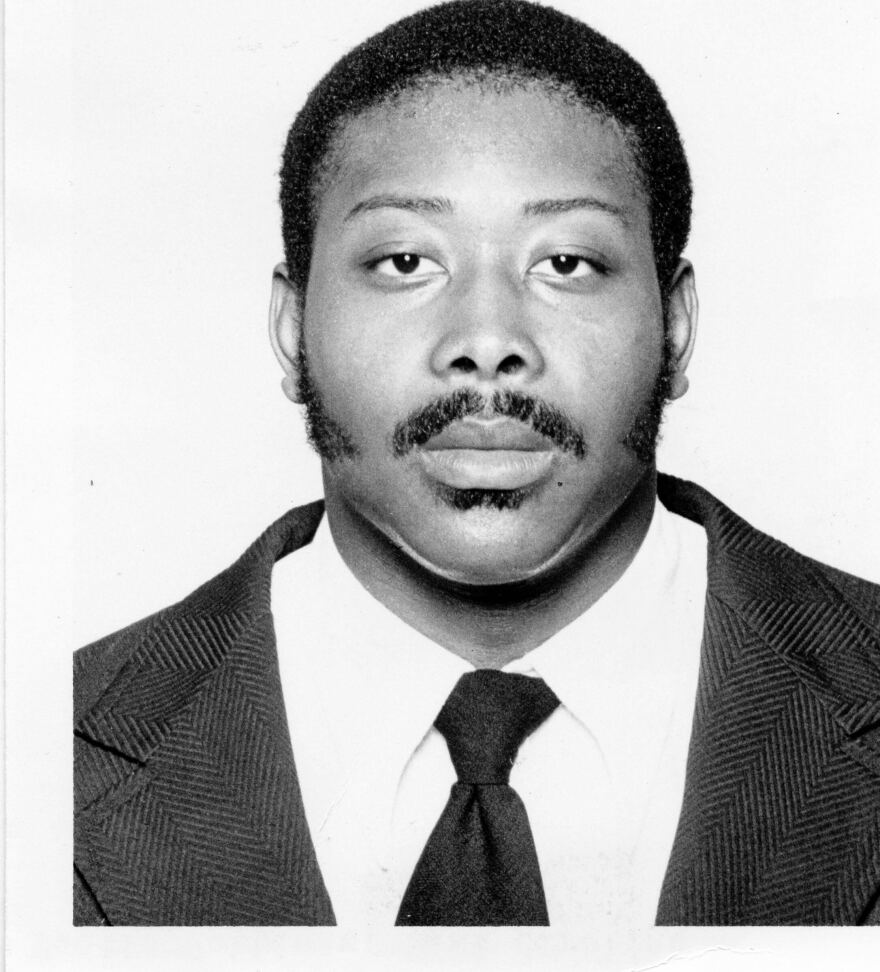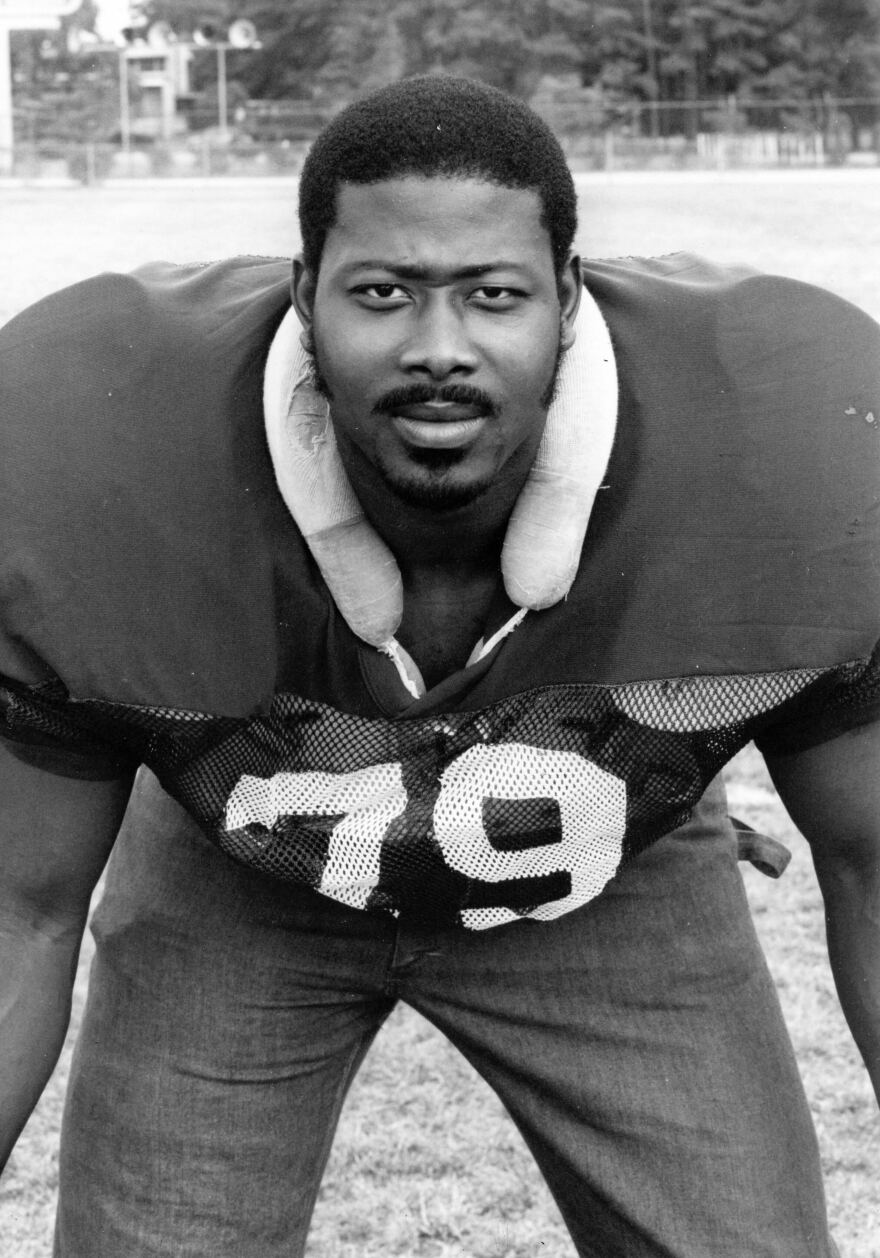It was 1978, and Ruffin McNeill was a junior defensive back for East Carolina University’s football team. That preseason, amid the summer heat in Greenville, he saw Tootie Robbins for the first time, lined up at right tackle, dominating the defender in front of him.
McNeill was blown away with how swiftly Robbins moved for being as large as he was — a 6-foot-5 bulldozer of a man whose typical playing weight was around 290 pounds.
He was one of the first individuals that I met who had the size and athleticism. As an offensive lineman, he was very athletic. Tall, long, physical. That’s why he played in the league so long. A very good athlete.Ruffin McNeill
“He was one of the first individuals that I met who had the size and athleticism,” McNeill told WUNC recently. “As an offensive lineman, he was very athletic. Tall, long, physical. That’s why he played in the league so long. A very good athlete.”
Over a 12-year career in the NFL, Robbins would earn the nickname “Big Smooth.” His play was quiet, but effective and consistent as he paved the way for running backs and protected passers. He started 147 of the 159 professional games he played in and went to the playoffs twice. And before all that, he was one of the greatest football players the East Carolina Pirates ever had.
James Elbert “Tootie” Robbins died on Aug. 2 in Chandler, Arizona, after contracting COVID-19. His wife Shaneeta Robbins confirmed his death to the New York Times, and his niece Lakeisha King confirmed it to USA Today. He was 62.
“He was just a fun-loving guy,” McNeill said of Robbins. “We were a very family-oriented team… He was a great person. Everybody got along with Tootie.
“I was sad to hear what happened to Tootie. My prayers go out to his family. Tootie was a great, great, great individual. I really enjoyed playing alongside him.”
Robbins told the Milwaukee Journal Sentinel that he was the first in his family to attend college. He became synonymous with football, from his playing days at ECU to his lengthy tenure in the trenches of the NFL. But a career in the sport almost never happened for him.

In 1978, as a freshman, he was a starter all year long at right tackle and his expertise in pushing would-be tacklers out of the way helped ECU beat Louisiana Tech in the Independence Bowl. But a week before the 1979 season started, Robbins left the team and went back home to Merry Hill and took a job in construction, putting his large frame and muscles to use in another way. Robbins would later tell the Raleigh News & Observer that he had a falling out with a few assistants on head coach Pat Dye’s coaching staff.
“I wasn’t really in shape. My attitude wasn’t good,” Robbins is quoted saying in the 1981 newspaper story. “We just didn’t get along. I guess you’d call it a personality conflict.”
But then Dye left after the 1979 season for a one-year gig at Wyoming, and most of his staff went with him. East Carolina hired Ed Emory away from Georgia Tech, and one of the first calls he made was to Robbins.
“I knew I wanted to come back. They let me make up my own mind; it was my decision,” Robbins said. “But they told me I had to commit myself to football, and that’s what I did.”

Indeed, Robbins turned himself into one of the finest football players to ever put on a Pirates’ uniform, and that’s not hyperbole. He was a multi-year letter-winner, earned All-American honors from the Associated Press as a senior in 1981 and was named ECU’s Offensive MVP that year. For an offensive lineman to do that – a player that doesn’t pile up catches, rushing yards or passing touchdowns – they have to be a pretty remarkable player. In 2013, Robbins was named to East Carolina’s All-Time Offensive Unit.
“He represented East Carolina very well,” said McNeill, who was the head football coach at ECU from 2010 through 2015 and is now an assistant coach at N.C. State. “Our players knew about him.”
Leading up to the NFL Draft in 1982, the Gannett News Service wrote that Robbins was a “tremendous physical talent who will need a lot of coaching.” And the Green Bay Press-Gazette wrote that, while Robbins was an “outstanding athlete,” he was a “long-shot” who “didn’t play in a big-time college program.”
Real NFL scouts didn’t quite agree. They thought Robbins was pretty special. And in the 1982 NFL Draft, the St. Louis Cardinals selected the Windsor, North Carolina, native with the 90th overall pick.
Robbins felt a sense of accomplishment. The farm boy – the son of sharecroppers who harvested tobacco, cotton and peanuts in the town of less than 3,000 people – had made it to the NFL. He was the first graduate of Bertie High School to play in the pros, and still just one of three from the school to take their football career that far.
“When I was little, I used to tell my mom and dad that maybe someday, they’d be watching me on TV,” Robbins told the St. Louis Post-Dispatch in 1982. “I figured, with the man upstairs and my mom and dad backing me, if I gave 100%, I’d make it.”
Despite the assessments from wannabe draft experts, Robbins impressed right away in training camp for the Cardinals, so much that the coaches moved All-Pro Dan Dierdorf from right tackle – the only position he had played in the pros – over to center to make room for Robbins among the starting unit. Robbins was named to the All-Rookie team in 1982.
And yes, his parents Cullen and Mary Robbins got to watch a ton of their son’s games on TV. In a 12-season career, Robbins played with the St. Louis and Phoenix Cardinals before finishing up in Green Bay with Mike Holmgreen’s Packers. He had the fourth-longest pro career of any ECU graduate.

After tearing his triceps during the 1993 with the Packers, Robbins called his wife, who was at the hair salon, and said “I’m done.”
“At the end of my 12th season, I knew in my heart I was done. You can only dance for so long,” Robbins told the Milwaukee Journal Sentinel. “I loved the game and didn't play it for the money.”
Shaneeta and Tootie had one son together, Barret Robbins, who had a build similar to his dad’s. The 6-foot-8 Barrett played college basketball at Grand Canyon University.
When he was at ECU, Tootie played some basketball too. He and Ruffin McNeill were on the same intramural team made up of football players.
“We didn’t lose much,” McNeill said. “With Tootie, we didn’t lose any, as a matter of fact… He was a great friend, a great player and a great teammate.”
In 1983, Robbins told UPI that he had “no idea” how he got the nickname Tootie, but it was given to him by either his mother or aunt, and he’s had it since elementary school. It was an odd nickname for someone who was a hulking football player.
“I never got used to the name of James. And Tootie is unique,” Robbins said in that interview. “You don't hear it very often, if ever. And I guarantee if you ever met another one, he wouldn't be as big as this Tootie.”








